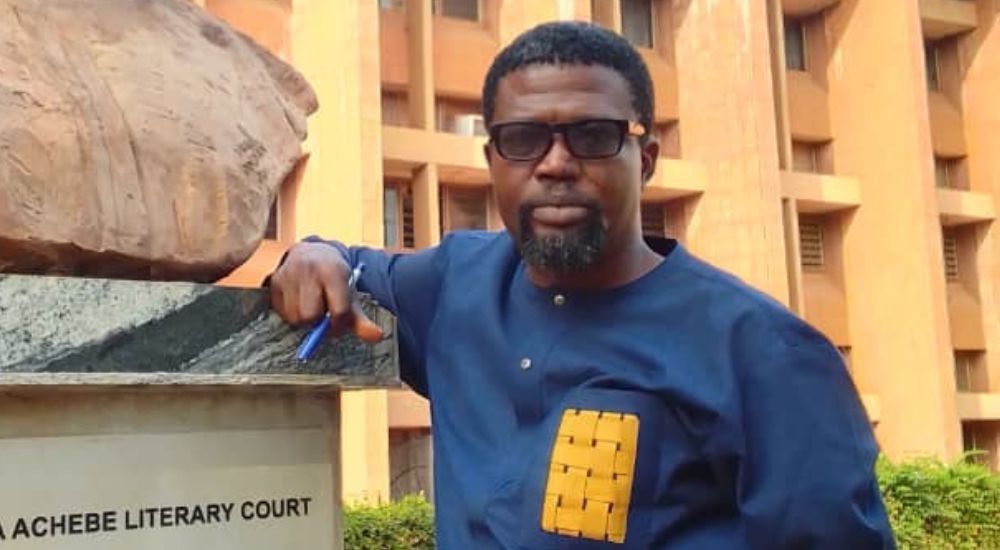Benjamin Itu, Akwa Ibom Humanitarian Giving Abandoned Children New Life
Saviour was only two years old when his teenage mother dumped him outside a house late at night in a community in Akwa-Ibom. He could barely walk and was just crawling on the floor when the owners of the house found him in the morning.
Many who saw his physical appearance gave up on him because he was emaciated with visible ribs and sunken eyes. But a Non-governmental Organisation(NGO), the Hold My Hand Foundation, that cares for street and abandoned children refused to give up hope on the toddler.
Speaking to THE WHISTLER, the Founder of the organisation, Benjamin Itu, explained that Saviour’s growth was stunted due to the trauma and lack of food adding that his organisation was only able to detect his age through his dentition.
“Nobody knows who his father is and why he was abandoned and nobody showed any interest in his well-being.
“This happened September last year and we took him to the hospital October after clearance with the community and Police. In the hospital, it was discovered that he has developed marasmic kwashiorkor, bacteria infection and compromised internal organs,” he explained.
However, Itu noted that with love and care, a few months after his rescue, Saviour has regained much flesh and is doing well.
Itu noted that Saviour’s case is one among the numerous cases his Foundation has handled, blaming the raising cases of street children in the state and the country to lack of the enforcement of Child Right Act, superstition, poverty, illiteracy and other issues.
Itu who himself was once a street child, stated that he started his NGO to provide the little succor he could for not just street and abandoned children but vulnerable women and families in the state.
Itu suffered a case of abandonment when his father left without any thoughts to his family in 1987.
But Itu still had his mother who was left alone to raise him and his siblings. However five years later, his mother had a breakdown in health and had to go to the village to recover.
Itu, who was only 12 at that time, was left to take care of his siblings and for that to happen, he had to hit the streets.
“My four younger ones and two cousins were under my care. I lost my childhood and became a provider. I ended up becoming a street child and supported my younger ones from the little I made hawking wares on the streets from Akwa ibom to Rivers State and Bayelsa,” he narrated.
But Itu’s story changed in 1996 when he met a corps member who came for his National Youth Service in the state.
“ I was at the stream where I was working as a sand ‘shifter’ and boat assistant for 16 years. He was trying to carry one bucket on his head and two others on his right and left hand. I offered to take the burden off his hands and I didn’t know he would be the one to take the burden off my life,” he narrated.
“Before then, I did trace my father to Calabar and returned my younger ones in 1997. That is ten years after he had left us,” he said.
Though Itu went on to become an Optician, his experience during his early years, being abandoned and turning into a street child, led him into becoming a “saviour” for not just street children but vulnerable girls and women.
“I started caring that early and the first child I took care of after his mother died immediately after delivery was in 1999. Since then, I have cared for over 100 abandoned/street children, vulnerable women and families in dire need,” he said.
His passion led him into shading off some parts of his work in 2014 to concentrate more on rescuing street and abandoned children.
“I didn’t even know it would become an NGO. I was just passionate about saving as many children as I could off the streets from the proceeds from my work.
“The number kept increasing from two children to four children and then eight children and 14 children and when we reached 21 children, the small room I stayed couldn’t contain us so we had to look for a place and then registered our passion with the government and that was how Hold My Hand Foundation was birthed,” he said.
The 44-year old Child’s Right Activist, explained that he named the Home, ‘My Brother’s Place’ because he didn’t want the children to feel the stigma that comes with the word ‘orphanage’.
“ I asked the children to call me Brother and we called our Home, ‘My Brother’s Place’ so that if they are met on the road and asked “where do you live?, instead of saying “in an Orphanage ” they will smile and said “I live at My Brother’s Place ” which takes way the stigma off them and the situation they are coming out of.
“It worked like magic as knowing they have a brother changes the narrative and gives them a boost in their confidence,” he explained.
Itu says his Foundation currently has over 40 children and women under its care.
“We are registered with the Child Protection Network under the regulation of the Ministry of Women Affairs and Social Welfare,” he said.
Speaking on how the Foundation works, he explained that their first point of call is the police after rescuing a child from the streets.
“There, we make an official report with the Nigerian Police and after profiling, we get an extract which we take to the Ministry of Women Affairs and Social Welfare.
“It’s at that point that the case is weighed and the next best solution is proffered which will often include but not excluded to family tracing, but if the child or woman is very traumatized and can’t provide the information immediately, government homes or other NGOs with shelter are recommended for shelter, care and further documentation,” he said.
Itu explained that though his Foundation works with other networks to ensure best practice, he has never received financial help from any government agencies or donor agencies at the moment.
“I have been blessed with friends and people who feel touched by the work we do and from time to time make a donation to support us,” he said.
He stated that the current economic situation in the country has posed a challenge in the aspect of shelter, feeding, education and medicare of the children and families in his care.
According to him, this challenge has made his organisation develop a concept called preventive charity which means strengthening, rehabilitation and reintegration of children and women into their families.
He noted that this has helped empowered them and lessen the burden for the organisation on a long term.
“The idea is more sustainable since people can’t depend on us forever. Preventive charity helps People to help themselves,” Itu noted.
The humanitarian who lamented the increasing number of street children in the country, noted that children grow better in homes than institutions.
United Nations Children’s Fund, (UNICEF) defines Children in street situations (CiSS) as children whose world and livelihood depends upon what they can obtain in the streets.
While the number of street children in the country is not certain, the United Nations Education Scientific and Cultural Organisation (UNESCO) puts the number of out-of-school children in Nigeria as 20.2 million.
To reduce the number of street children in the country, Itu advocated that the government should loosen the ‘tightness’ in adoption process and make foster parenting and guardians as popular as the presence of churches in the streets.
“We will have no children on the streets in the next five years because there are thousands of families without children who are eager to raise these children if they are given the chance to,” he said.
He stated that though the government has already put in place laws to protect children and vulnerable women, implementation of those laws has always been a challenge and called for strict implementation of the Child Rights Act and other laws to protect not just children but vulnerable persons.
Itu also called on the government to ensure that families are held accountable for abandoning their duties to their children.
“If people are prosecuted for child abandonment which is a crime, others will wake up especially absent fathers to their responsibility,” he said.
Benjamin Itu, Akwa Ibom Humanitarian Giving Abandoned Children New Life is first published on The Whistler Newspaper




